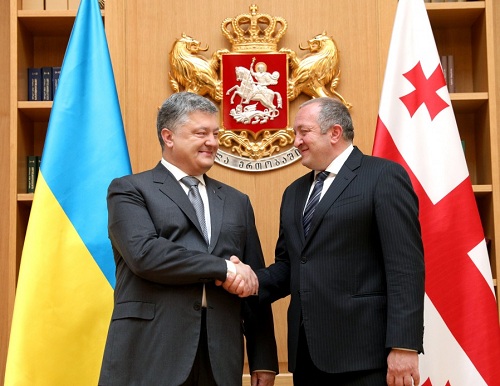| Ukraine, Georgia Pledge Strategic Partnership |
| Civil Georgia, Tbilisi / 20 Jul.'17 / 14:58 |

Petro Poroshenko and Giorgi Margvelashvili, July 18, 2017. Photo: president.gov.ua
Ukrainian President Petro Poroshenko paid his first official visit to Tbilisi on July 17-19 and held talks with the President, the Prime Minister and the Parliamentary Chairman.
Poroshenko also participated in the Georgian-Ukrainian business forum in Tbilisi, opened the two countries’ investment forum in Batumi and met with the Chairman of the Government of Adjara, Zurab Pataradze.
During his meeting with Prime Minister Giorgi Kvirikashvili, President Poroshenko thanked Georgia for its support and humanitarian assistance in the context of the ongoing war in the Donbass region.
The sides also discussed the issues of Russian occupation, trade, European and Euro-Atlantic integration, the upcoming Eastern Partnership summit, and large-scale international transit projects.
With his Georgian counterpart, Giorgi Margvelashvili, the two leaders signed the declaration on establishing strategic partnership between Ukraine and Georgia, recognizing the common bonds and challenges of the two countries and setting bilateral and multilateral partnership plans for deoccupation, pressuring Moscow diplomatically, intensifying economic cooperation and pursuing their European and Euro-Atlantic aspirations.
At the meeting of the two Presidents, the sides also focused on close bilateral cooperation in diplomatic venues, among them the United Nations General Assembly and the Security Council. “We have similar problems – Abkhazia and South Ossetia in Georgia; Crimea and certain districts of Donbas in Ukraine: thus, we must intensify cooperation in the UN, first of all in the Security Council,” Poroshenko noted.
He also expressed optimism regarding the two countries’ European aspirations and welcomed their efforts to secure NATO membership, saying it was very important for “ensuring security in both Ukraine and Georgia”.
Speaking at a joint press conference after the meeting with President Margvelashvili, Poroshenko thanked those Georgians “who came to the Ukrainian Armed Forces [after the war was unleashed] in 2014 as they were confident that by defending our sovereignty and territorial integrity, they would defend Georgia.”
“Today you are on the battlefield and you can see well what we, the Georgians, have gone through in the 1990s and in 2008,” President Margvelashvili replied. “These challenges are triggered by our neighbor, the Russian Federation’s policy of the spheres of privileged interests, which leads only to destabilization, human tragedy and parting of peoples,” he added.
President Giorgi Margvelashvili also expressed readiness to continue partnering with Ukraine on the international arena, and called for the continuation of joint Georgian-Ukrainian diplomatic activities in international formats, among them the UN, OSCE and the Council of Europe.
Economic cooperation between Georgia and Ukraine was also on the agenda of Poroshenko’s visit to Georgia. The steps discussed included elimination of barriers, coordination of tariffs for railway and ferry transportation through the ports of Ukraine and Georgia, as well as the enhancement of free trade area.
Addressing the Georgian-Ukrainian business forum on July 18, President Poroshenko called for increasing bilateral trade turnover from its 2016 figure of USD 526 million to USD 1 billion in coming years. “526 million dollars in 2016. We think it does not reflect the potential Ukraine and Georgia have. We have set a goal to raise our trade turnover up to 1 billion dollars in a few years,” Poroshenko noted.
PM Kvirikashvili spoke at the business forum as well, saying that the country “offers attractive investment climate” to Ukrainian businesses.
On July 19, Poroshenko, together with Margvelashvili, travelled to Khurvaleti, a village adjacent to Tskhinvali Region/South Ossetia, which has been split in two by the Russian barbed wire and thus became a symbol of Russia’s encroachment on the Georgian territory.
“We have a common aggressor - both Ukraine and Georgia - and this is the Russian Federation. The situation in the occupied territories is pretty similar: chaos, hopelessness, humanitarian disaster,” Poroshenko stated after his brief conversation with Davit Vanishvili, a local resident whose house was cut off from the village.
Боляче дивитися в очі людей, які опинились за колючим дротом російської окупації в дружній нам Грузії. pic.twitter.com/sw9PkVSGtW
— Петро Порошенко (@poroshenko) July 19, 2017
The Ukrainian President also emphasized that the occupation has a “political-diplomatic” solution and for that, “the unity of the whole world and solidarity with Georgia and Ukraine” is needed.
